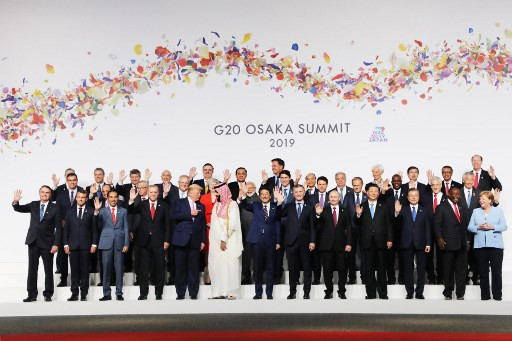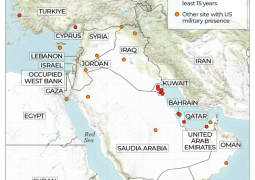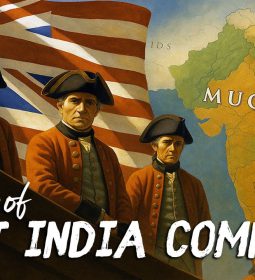Multilateralism: A pillar of economic stability

- Josh Frydenberg, Heng Swee Keat, Sri Mulyani Indrawati and Bill Morneau
–
Canberra/Singapore/Jakarta/Ottawa / Fri, September 13, 2019 / 09:37 am
The G20 Summit started with a photo session with state leaders, including (first row, from left) Brazil President Jair Bolsonaro, French President Emmanuel Macron, Indonesia President Joko Widodo, Chinese President Xi Jinping, United States President Donald Trump, Saudi Arabia’s Crown Prince Salman, Japan Prime Minister Shinxo Abe, Argentine President Mauricio Macri, Russian President Vladimir Putin, Turkish President Recep Tayyip Erdogan, South Korean President Moon Jae-in, South African President Cyril Ramaphosa, Netherlands Prime Minister Mark Rutte, as well as (second row, from left) Spanish Prime Minister Pedro Sanchez, Egypt President Abdel Fattah el-Sisi, President of the European Commission Jean-Claude Juncker, Australia’s Prime Minister Scott Morrison, British Prime Minister Theresa May, India Prime Minister Narendra Modi, Canada Prime Minister Justin Trudeau, Italian Prime Minister Giuseppe Conte, European Union President of the European Council Donald Tusk, Senegal President Macky Sall, Chile President Sebastian Pinera and Singapore Prime Minister Lee Hsien Loong. (AFP/Ludovic Marin)
Since the Bretton Woods system was agreed to more than 70 years ago, nations have been coming together in pursuit of global public goods. These efforts have given us the international trading system and the global financial safety net. This is multilateralism in action, and it has been a pillar of our shared success.
The free flow of trade, investment and ideas has helped to lift more people out of poverty than ever before. Prosperous and growing middle classes are broadening opportunities for the exchange of goods, services and innovation across the world.
The multilateral system provides economic and political security to allow both big and small countries to fulfill their tremendous potential.
As beneficiaries of this system, we have a responsibility to safeguard the institutions that have led to our shared economic success. We need to work together to forge consensus on pressing global challenges.
At this moment, rising trade tensions are a serious concern. While we acknowledge that there are legitimate issues that must be addressed, the risks of collateral damage are growing.
Uncertainty over the outlook is contributing to a slowdown in trade and manufacturing activity. We have seen a return of financial market volatility, currency instability and decreased capital flows to emerging economies. Dampened global trade conditions are affecting investor confidence, business investment and productivity. Growth has slowed and risks remain tilted to the downside. The World Bank and the International Monetary Fund continue to revise down their economic growth forecasts.
We must not resort to unilateralism and protectionism. Pursuing confrontation over dialogue will only exacerbate risks, erode confidence and weaken the prospect of global economic recovery. Compromise is key to achieving win-win outcomes, as well as trust that others are sticking to the agreed rules.
Multilateralism relies upon the core principles of nondiscrimination, predictability and transparency. We abide by these principles because we know that they work.
In 2008, economic leaders from around the world — especially among Group of 20 economies — came together to safeguard the global economy. Leaders took decisive and coordinated actions that were widely acknowledged as having boosted consumer and business confidence and supported the first stages of economic recovery. And the G20 went on to put in place the reforms needed to promote financial stability through more coordinated and stronger regulation and oversight.
More recently, G20 leaders responded to growing concerns about corporate tax avoidance. In November 2015, they agreed on a strategy to ensure that multinational profits are taxed in the country where economic activity occurs. This consensus demonstrated a commitment to fairness, transparency and accountability on a complex cross-border challenge.
In the current global environment, it is this sort of leadership and cooperation that we need. The G20 is an important forum for global leaders to agree on solutions to our shared problems. Small enough to be efficient yet large enough to be representative of global voices, the G20 creates an opportunity for compromise and progress.
But there are legitimate concerns that the multilateral system is struggling to manage the complexity of today’s global economy.
We must come together to find concrete solutions. Some obvious ways forward involve taking an honest look at our trading system, reforming multilateral institutions, and developing a multilateral agreement on digital taxation.
These are each separate issue but must be dealt with in the same way: through multilateral dialogue and consensus-building. And by doing so, we will reduce the incentive for unilateral actions and increase respect for international norms and laws.
As upcoming G20 presidents, Saudi Arabia, Italy, and India will have the opportunity and the important responsibility of setting the G20’s strategic direction over the next three years.
The G20 must continue to support an open trading system and a global financial safety net that can withstand times of crisis. Significant progress can also be made on problems like infrastructure investment and disaster resilience. There is also value in sharing our experiences addressing national challenges such as the future of work, women’s economic empowerment and competition policy.
Harking back to its origins in the global financial crisis, the G20 needs to continue to build mutual understanding and cooperation, so that it can continue to uphold and support multilateral problem-solving in the event of another economic crisis.
To rebuild lost confidence, our multilateral system needs newfound strength to withstand the complexity of our current circumstances. This is not something that one or two countries can do alone. All of us must play a role in restoring the system that has contributed so much to our shared growth and prosperity over the past 70 years.
Our collective determination and wisdom can return the global economy onto a more positive path. As senior ministers, we will use all our energies to encourage cooperation on the global challenges we face together.
***
Josh Frydenberg is the Treasurer of Australia and Deputy Leader of the Liberal Party. Heng Swee Keat is the Deputy Prime Minister and Finance Minister of Singapore. Sri Mulyani Indrawati is the Finance Minister of Indonesia. Bill Morneau is the Finance Minister of Canada.
- Previous ‘Accidental war with India a possibility’, says Pakistan foreign minister
- Next RI looks to bolster ties with S. Korea, US through comprehensive trade agreements
















